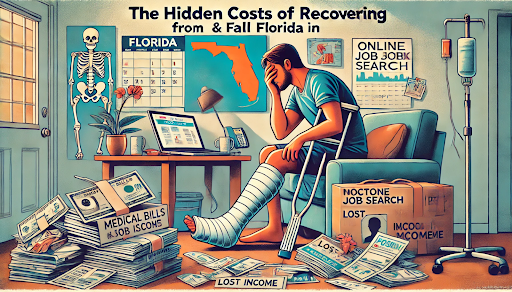Recovering from a slip-and-fall accident in Florida can be more costly than many people realize. Beyond the immediate medical expenses, victims often face a series of hidden costs that can add significant financial strain. These hidden costs include lost wages from time off work, expensive physical therapy, and potential modifications to one’s home if the injuries are severe.
Additionally, navigating the legal landscape to seek compensation can be daunting and time-consuming. Victims may need the expertise of personal injury lawyers in Florida to help manage their cases effectively. Legal fees and associated costs can further complicate financial recovery, adding pressure to an already stressful situation.
Moreover, the mental and emotional toll of dealing with long-term injuries and financial instability shouldn’t be underestimated. Emotional support and counseling may be necessary, but these services are often not covered by insurance. All these hidden costs can make the recovery process from a slip and fall accident in Florida exceptionally challenging.
Understanding Slip and Fall Accidents in Florida
Slip and fall accidents in Florida involve specific legal considerations, including premises liability law, determining fault, and the statute of limitations for claims. These aspects are crucial for injured parties seeking compensation.
The Basics of Premises Liability Law
In Florida, premises liability law holds property owners accountable for maintaining safe premises. This means they have a duty of care to prevent dangerous conditions that could lead to slip and fall accidents. If a property owner fails to address hazards like wet floors or uneven sidewalks, they can be held liable for injuries that occur.
Premises liability cases often hinge on proving that the property owner knew, or should have known, about the dangerous condition. Evidence such as maintenance records, witness statements, and surveillance footage can be critical.
Determining Fault and Liability
Determining fault in slip and fall cases is essential for securing compensation. Florida follows the comparative negligence rule, which means fault can be shared between the injured party and the property owner.
For instance, if a person slips on a wet floor in a grocery store, the store may be partially at fault for not placing a warning sign. If the injured party is found to be 20% at fault for not noticing the sign, their compensation is reduced by that percentage. Proving liability involves demonstrating that the property owner neglected their duty to maintain a safe environment.
Statute of Limitations for Claims
Victims of slip and fall accidents in Florida must file their claims within a specific timeframe known as the statute of limitations. In Florida, this period is usually four years from the date of the accident.
Failing to file within this window can result in the loss of the right to seek compensation. It’s crucial for victims to act promptly, gathering evidence and consulting with an attorney to ensure their claims are filed on time.
Understanding these legal thresholds helps streamline the process and increases the chances of a successful outcome.
Financial Impact of a Slip and Fall Injury
The financial repercussions of a slip and fall injury in Florida can be substantial, impacting both the immediate and long-term financial stability of the victim. These impacts are divided into direct and indirect costs, evaluation of damages and compensation, and the role that legal assistance plays in obtaining fair compensation.
Direct and Indirect Costs
Direct costs of a slip and fall injury often encompass medical expenses such as hospital bills, surgeries, and medical treatments. These can quickly accumulate, placing a significant economic burden on the injured party. In addition, the victim might face ongoing costs for rehabilitation and medications.
Indirect costs include lost wages and diminished earning capacity. As the victim recovers, they may be unable to return to work or may need to reduce their hours, leading to financial strain. Additionally, there could be costs associated with personal care and home modifications that are necessary to accommodate any long-term disabilities resulting from the accident.
Evaluating Damages and Compensation
Evaluating damages in a slip-and-fall case involves calculating economic damages and non-economic damages. Economic damages cover tangible costs such as medical bills, lost wages, and any other out-of-pocket expenses related to the injury. Non-economic damages, on the other hand, compensate for pain and suffering, emotional distress, and loss of enjoyment of life.
Insurance companies often play a crucial role in determining the settlement amount. It’s essential for victims to understand how these settlements are calculated to avoid being shortchanged by an insurance company. Working with a slip and fall attorney can ensure a proper valuation of the damages and a fair financial compensation package.
The Role of Legal Assistance
Legal assistance is paramount in navigating a slip-and-fall case. A personal injury attorney can provide valuable support from the initial consultation through to the litigation process. They help evaluate personal injury claims, gather evidence, and negotiate with insurance companies.
Engaging a legal team can also aid in avoiding common pitfalls and maximizing compensation. Lawyers can assist in accurately estimating both economic and non-economic damages, ensuring all aspects of the victim’s suffering are taken into account. This professional guidance is crucial in achieving an equitable settlement or win in court.
In Conclusion
Recovering from a slip and fall accident in Florida can bring unexpected expenses beyond initial medical bills.
Medical Costs Beyond Initial Treatment:
- Ongoing physical therapy
- Specialist consultations
- Prescription medications
Legal Expenses:
- Attorney fees
- Court fees
- Costs for expert witnesses
Lost Wages and Reduced Earning Capacity:
- Time off work during recovery
- Permanent disabilities affecting future earnings
Home Modifications:
- Installation of ramps or grab bars
- Modifications for mobility aids
Emotional and Psychological Counseling:
- Therapy sessions
- Support group fees
Miscellaneous Unplanned Costs:
- Travel expenses for medical appointments
- Childcare during recovery
- Increased daily living expenses due to temporary disabilities
Being aware of these costs helps in better financial planning during the recovery process. Proper legal representation can also aid in navigating these expenses and securing appropriate compensation.
Keep an eye for more latest news & updates on Internal Insider!










